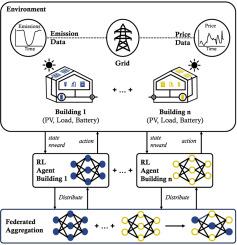联合强化学习用于可持续和经济高效的能源管理
IF 9.6
Q1 COMPUTER SCIENCE, ARTIFICIAL INTELLIGENCE
引用次数: 0
摘要
将可再生能源整合到电网中会带来波动性和复杂性,需要先进的能源管理系统。通过优化建筑物电池系统的充电和放电行为,强化学习有效地提供灵活性,管理不稳定的能源需求,动态定价和光伏输出,以最大化回报。然而,由于隐私问题、不稳定的训练过程以及推广到不同家庭条件的挑战,训练数据的访问受限往往阻碍了强化学习的有效性。在这项研究中,我们提出了一个新的联合框架,用于能源管理系统中的强化学习。通过在私有数据上进行本地模型训练,并在全局服务器上仅聚合模型参数,该方法不仅保护了隐私,还提高了模型在不同家庭条件下的泛化和鲁棒性,同时降低了每座建筑物的电力成本和排放量。对于一个全面的基准,我们将标准强化学习与我们的联邦方法进行比较,并包括混合整数规划和基于规则的系统。在强化学习方法中,深度确定性策略梯度在Ausgrid数据集上表现最好,联邦学习将成本降低5.01%,排放量降低4.60%。联邦学习还提高了未见建筑的零射击性能,降低了5.11%的成本和5.55%的排放量。因此,我们的研究结果强调了联合强化学习通过平衡隐私、可持续性和效率来增强能源管理系统的潜力。本文章由计算机程序翻译,如有差异,请以英文原文为准。

Federated reinforcement learning for sustainable and cost-efficient energy management
Integrating renewable energy sources into the electricity grid introduces volatility and complexity, requiring advanced energy management systems. By optimizing the charging and discharging behavior of a building’s battery system, reinforcement learning effectively provides flexibility, managing volatile energy demand, dynamic pricing, and photovoltaic output to maximize rewards. However, the effectiveness of reinforcement learning is often hindered by limited access to training data due to privacy concerns, unstable training processes, and challenges in generalizing to different household conditions. In this study, we propose a novel federated framework for reinforcement learning in energy management systems. By enabling local model training on private data and aggregating only model parameters on a global server, this approach not only preserves privacy but also improves model generalization and robustness under varying household conditions, while decreasing electricity costs and emissions per building. For a comprehensive benchmark, we compare standard reinforcement learning with our federated approach and include mixed integer programming and rule-based systems. Among the reinforcement learning methods, deep deterministic policy gradient performed best on the Ausgrid dataset, with federated learning reducing costs by 5.01 % and emissions by 4.60 %. Federated learning also improved zero-shot performance for unseen buildings, reducing costs by 5.11 % and emissions by 5.55 %. Thus, our findings highlight the potential of federated reinforcement learning to enhance energy management systems by balancing privacy, sustainability, and efficiency.
求助全文
通过发布文献求助,成功后即可免费获取论文全文。
去求助
来源期刊

Energy and AI
Engineering-Engineering (miscellaneous)
CiteScore
16.50
自引率
0.00%
发文量
64
审稿时长
56 days
 求助内容:
求助内容: 应助结果提醒方式:
应助结果提醒方式:


